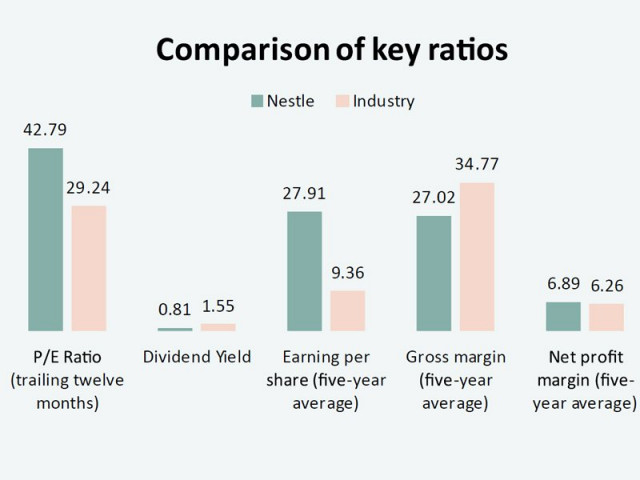Corporate results: Profits soar at Nestle Pakistan as margins rise again
Gross margins rise as Pakistanis consume higher value-added products.

Nestle is currently on track to invest upwards of CHF320 million ($347 million) in expanding its production capacity within Pakistan as part of a three-year plan.
Profits at Nestle Pakistan shot up in 2012 as the company saw its margins increase for the first time in four years, as more and more consumers from Pakistan’s rising middle class are able to afford some of its higher-margin products.
On Monday, the company announced its financial results for the year ending December 31, 2012 – and it was a remarkably positive report: net revenues were up 22% for the year to Rs79 billion, and profits up an even higher 25.6% to Rs5.9 billion compared to the same period in the previous year.
The strong revenue growth for Nestle is particularly remarkable, considering the fact that it is the largest food and consumer goods company in the country, and yet still shows little sign of a slowdown in growth. Indeed, much of that growth appears to be volumetric, showing that consumers have a higher demand for Nestle’s products rather than revenue increases simply being a function of inflation.
But perhaps most encouraging for the company was its increase in gross profit margins, which rose from 25.8% in 2011 to 27.2% in 2012, suggesting that the company is selling more of its higher-margin products. At least some of that higher margin, however, was eroded by higher logistics and distribution costs.
Part of the reason for those higher costs is the installation of more refrigerators as more of its chilled products get sold (mostly yogurt). But another part of it may be that the company is expanding its distribution network into areas where transportation infrastructure is poor and cost of getting products to customers is higher, driving up its overall average.
Nonetheless, Nestle’s size in Pakistan – though miniscule by global standards – appears to insulate it from the kinds of risks that some of its smaller competitors face. Engro Foods, for instance, has somewhat higher distribution costs as a percentage of revenues than Nestle.
Nestle Pakistan’s Swiss parent is the world’s largest food company, with a wide array of products: from those that are commodity-like, to higher-margin products like health foods and chocolates. In Pakistan, however, Nestle has, until recently, been primarily a dairy company. Indeed, until the early 2000s, Nestle’s presence in the country was incorporated as Nestle Milkpak Ltd, named after its signature product. It remains the largest player in the dairy market, collecting milk from an estimated 190,000 farmers spread over 145,000 square kilometres in Punjab and Sindh.
Over the past few years, the company has expanded its product portfolio in Pakistan to include fruit juices, breakfast cereals, instant noodles and confectionaries. But it is still a small proportion of its global portfolio.
Nestle’s ability to rapidly grow its revenues and profits despite being the biggest player in Pakistan appears to be indicative of the tremendous room for growth in the Pakistani market. Consumer spending is expanding as the country’s middle class grows on the back of rapid urbanisation, and increasing household incomes as more and more young people enter the workforce.
Even the advent of a strong local rival in the form of Engro Foods does not appear to have dented Nestle’s growth prospects. In earlier conversations with The Express Tribune, officials at both Nestle and Engro Foods are keen to downplay any talk of a rivalry between the two companies, insisting that there is plenty of room for both to grow. Considering the blowout growth at both firms, there appears to be considerable merit to their argument.
The global giant is currently on track to invest upwards of CHF320 million ($347 million) in expanding its production capacity within Pakistan as part of a three-year plan.
Nestle Pakistan officials were unavailable for comments.
Published in The Express Tribune, February 19th, 2013.
Like Business on Facebook to stay informed and join in the conversation.



















COMMENTS
Comments are moderated and generally will be posted if they are on-topic and not abusive.
For more information, please see our Comments FAQ